About IPA-GP
Based on the Cancer Control Act (Act No. 98 of 2006), the Office for Cancer Control in the General Affairs Division of the Health Service Bureau, Ministry of Health, Labour and Welfare implemented the Basic Plan to Promote Cancer Control Programs.
Five years had passed since the approval of the previous Basic Plan, and the implementation of “team medicine” and “enhanced cancer control measures for the working population” were pointed out as predominant issues that should be newly addressed between 2012 and 2016. More specifically, “We aim to create a society where people with cancer can live and work with peace of mind through enhanced consultation support systems and the promotion of understanding in the workplace, after clarifying needs and issues relating to employment.”
Our team is working to realize the following objectives while following Japan’s national policies:
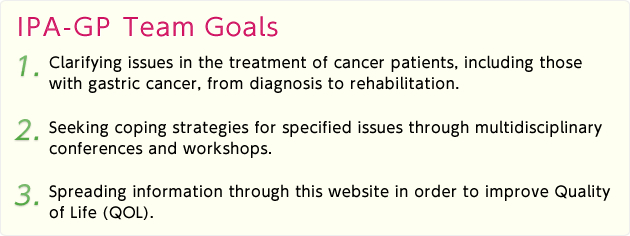
IPA-GP Team Activities
Grants-in-Aid for Scientific Research
- “Care for Patients Who Have Undergone Laparoscopic Gastric Cancer Resection: Developing a Support Program for improving inconveniences in the social life” Issue No. 25463439 (Grant-in-aid for Scientific Research (C) 2013–2015)
- “Development of a Discharge Support Program Focusing on Employment Support, Based on Multidisciplinary Care for Patients Who Have Digestive System Cancer” Issue No. 16K12075 (Grant-in-aid for Scientific Research (C) 2016–2018)
- FY2018
- Plan to distribute the “Support Program to Fulfill the Model Criteria for Workplaces that Accept Employees” that we have created in 2,000 company workplaces, and promote policies for the employment of cancer patients.
- Plan to add an English-language version of this website.
- FY2017
- Put our knowledge of issues surrounding employment and the literature review to practical use and created a survey sheet about the current situation and issues in workplaces for patients.
- Selected 2,000 companies published in the Kaisha Shikiho (the Japan company handbook; includes listed companies and unlisted companies) from the Kanto area using a stratified random sampling method and carried out survey.
- Carried out survey with cooperation from associations for patients with digestive issues.
- FY2016
- Took part in a workshop in which companies also participated: “Better Support for Workplaces and Workers with Cancer,” and took the opportunity to create a survey sheet.
- Held a workshop with multiple disciplines, patients, workplace managers (HR representatives, etc.), labor lawyers, and social workers, and refined the “Support Program to Fulfill the Model Criteria for Workplaces that Accept Employees.”
- Had the content of the workshop recorded and edited by a specialist cameraman and uploaded it onto the website as a video.
- FY2015
- Article: “Lifestyle Support Post-gastrectomy: Site for ‘Sharing Experiences’ Established” published in the Shimotsuke Shimbun on Sunday June 7, 2015.
- Distributed the Grant-in-Aid for Scientific Research (C) for 2013-2015 research report in 458 medium-sized hospitals in 2016 and raised awareness.
- Carried out surveys about the relationship between the frequency of use of websites for cancer survivors and QOL.
- FY2014
- “Support for people who have undergone surgery for gastric cancer from many different specialists, considering issues of inconveniences in the social life”; launched the International University of Health and Welfare (IUHW) IPA-GP via the homepage.
- Held a workshop: “Multidisciplinary Support for Eating and Exercise Post-gastrectomy.”
- Introduced the above activities through IUHW Nogizaka School.
- Created an “information card,” established it on the wards and for outpatients, and made our patients aware of it.
- FY2013
- Carried out surveys to identify issues of improving inconveniences in the social life of patients with gastric cancer.
- Gave a research report on “The Relationship Between PGSAS and Physical and Social Causes: Interviews with Nurses in Outpatient Departments” at the 43rd meeting of the Japanese Society for Gastro-surgical Pathophysiology.
- Held a workshop: “Considering Support for Issues Improving Inconveniences in the Social Life Together with Patients.”
IPA-GP Organization
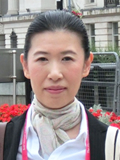 Representative: Yuko Itoi Representative: Yuko Itoi |
 Michiko Fukushima Michiko Fukushima |
|---|---|
| Sports and Health Science, Daito Bunka University Department of Nursing Science Professor Specialty: Adult nursing (Past) School of Health Sciences, IUHW Department of Nursing Having gained experience as a nurse, I am currently involved in educational activities in university and graduate school, as well as research activities relating to cancer nursing and autonomic nerves. |
Faculty of Health and Welfare, Tokushima Bunri University Department of Nursing Professor Specialty: Regional and home nursing care After gaining experience as a public health nurse in a hospital, I entered nursing education. My interest lies in support for patients after they are discharged and family nursing. |
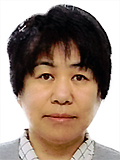 Akemi Suzuki Akemi Suzuki |
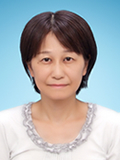 Kako Ochiai Kako Ochiai |
| Sports and Health Science, Daito Bunka University Department of Nursing Science Lecturer Specialty: Adult nursing (Past) School of Health Sciences, IUHW Department of Nursing I come into contact with cancer patients as a certified nurse. I am currently involved in educational and research activities concerning the improvement of the QOL of people living with illness. |
School of Health Sciences, IUHW Department of Nursing Lecturer Specialty: Home care I have an interest in the issues surrounding the everyday lives of home care professionals and families involved in nursing, their support methods, and the management of home nursing stations; I am currently carrying out educational and research activities in university. |
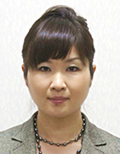 Junko Kaneko Junko Kaneko |
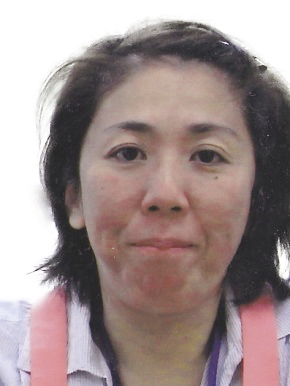 Mikako Kuwano Mikako Kuwano |
| School of Health Sciences, IUHW Department of Nursing Lecturer Specialty: Adult care and nursing Having worked as a nurse, I am currently carrying out educational and research activities. |
School of Health Sciences, IUHW Department of Nursing Assistant Professor Specialty: Community health nursing Having worked as a nurse, I am currently carrying out educational and research activities. |
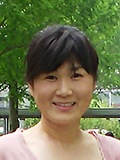 Miyuki Onozaki Miyuki Onozaki |
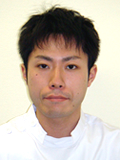 Tsuyoshi Hara Tsuyoshi Hara |
| School of Health Sciences, IUHW Department of Nursing Assistant Specialty: Adult Care and Nursing Having worked as a nurse, I am currently carrying out educational and research activities. |
School of Health Sciences, IUHW Department of Physical Therapy Lecturer Specialty: Cancer rehabilitation I mainly carry out rehabilitation for cancer patients before and after surgery. |
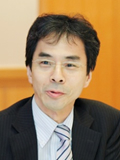 Masashi Yoshida Masashi Yoshida |
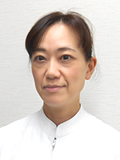 Kiko Asuwa Kiko Asuwa |
| IUHW Hospital Professor (Outpatients: Wednesdays) IUHW Mita Hospital Part time work (Outpatients: Monday) Specialty: Gastric cancer treatment The stomach is a “social organ” that supports our modern social lives. We will consider what it means to have that social organ removed together. |
IUHW Mita Hospital
Head of the Nursing Department Responsible for 4F outpatients
I started in surgery and gastroenterology wards when I was a new nurse. After eight years of basic nursing education, I am now working in the outpatient department, mainly with people with digestive issues. |
 Michie Suzuki Michie Suzuki |
|
| IUHW Mita Hospital Nutrition Specialty: Managerial dietician I carry out nutritional management duties and food provision management duties for patients with a focus on nutritional guidance. |
Introduction to the IUHW Mita Hospital Digestive Diseases Center
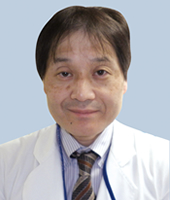
Head of the Digestive
Diseases Center
IUHW Hospital Professor
Yoshifumi Ikeda
Our hospital’s Digestive Diseases Center has 14 full-time members and 1 part-time doctor; together with the president of IUHW, Masaki Kitajima, there are 16 of us, and our small and select group carries out diagnosis and treatment. In terms of surgery, we have three teams, the upper gastrointestinal tract team, the lower gastrointestinal tract team, and the hepato-biliary-pancreatic team, who work together to carry out tests and operations relating to benign and nonbenign general diseases of the digestive organs. We also focus on a wide range of surgical illnesses, such as treatment for hernias, wounds and thyroid diseases, and anti-cancer drug treatments.
Notably, we actively engage in minimally invasive treatments using laparoscopies and thoracoscopies, applying these to many organ cancers, including those of the esophagus, stomach, colon, liver, and pancreas, and maintaining high levels of functionality.
In terms of internal digestive medicine, we engage in treatments of the alimentary canal and hepato-biliary-pancreatic area, carrying out tests and treatments primarily with endoscopes. Using cutting-edge endoscopies means that we can offer safe healthcare, from the early detection of minute lesions to early treatment. Notably, the numbers of endoscopic surgeries for early-stage esophageal and gastric cancers are dramatically increasing, and it is not an exaggeration to say that our services are excellent enough to be the best in Tokyo. In addition, as we use a center-based system in our hospital, we accurately handle patients undergoing quick cancer surgeries and emergency cases through close cooperation between our surgical and internal medicine teams.
Moreover, we approach treatments via a system of mutual support, with cooperation from the Head and Neck Oncology Center, Gynecology, Urology, the Respiratory Diseases Center and others, and are constructing a system that will enable us to carry out safe and reliable treatments for our patients regardless of any complications or diseases.
IUHW Mita Hospital Digestive Diseases Center






